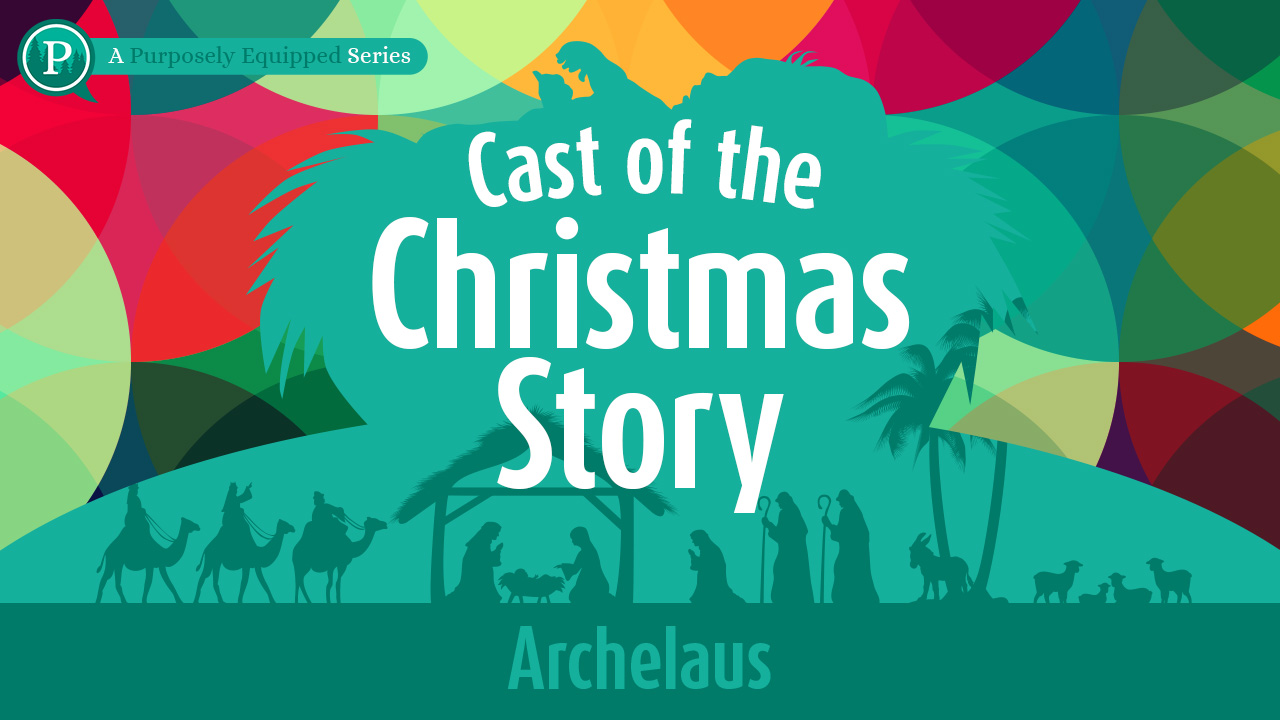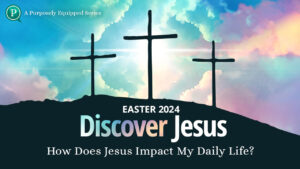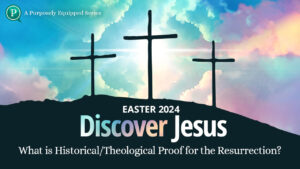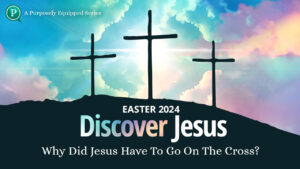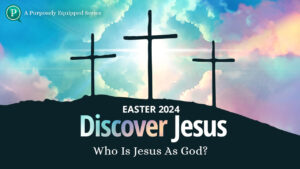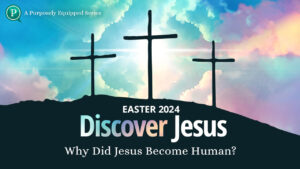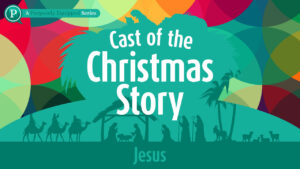Have you heard of Archelaus? He is not a well known person in the Christmas story. Pastor Barry Crane from North Sound Church discusses the character of Archelaus. Archelaus, who is mentioned only once in the Bible, was a narcissistic and immoral leader who ruled over Judea after the death of his father, Herod the Great. Pastor Crane contrasts Archelaus with King David, who, despite his flaws, was humble and repentant.
Special thanks to World Concern Global Gift Guide, for bringing us the Cast of the Christmas Story!
Show Notes:
- Discover more about North Sound Church
- World Concern Global Gift Guide
Transcription:
Mark Holland:
The Cast of the Christmas Story series is sponsored by World Concern and the Global Gift Guide. Find out more at globalgiftguide.org.
Voiceover:
The Cast of the Christmas Story.
Mark Holland:
As we continue with The Cast of the Christmas Story, we are coming up to an obscure person in the story. It’s amazing how much our guest today is going to be able to draw out of this person’s life, though. We have in studio, actually, my pastor at North Sound Church in Edmonds, Pastor Barry Crane. Hi there, Barry.
Pastor Barry Crane:
Hello there.
Mark Holland:
Good to see you again.
Pastor Barry Crane:
I understand that not only do you volunteer at church to help with our livestream production, but this week, you’re going to be doing Club Grub.
Mark Holland:
Yeah. As we’re recording, I sit there waiting for the livestream part and I say, “Well, I need to be doing something else of service.” So yeah, I’m going to jump in there. Do I get to cook, too, one of these days?
Pastor Barry Crane:
You may get to cook, but I think you get to wear an apron, and I can’t wait to see that.
Mark Holland:
So that’s what’s happening at North. What else is happening at North Sound these days? We’re in the Christmas season. [inaudible 00:01:17]
Pastor Barry Crane:
I don’t know when this is going to play, but I got a Christmas kids presentation coming up with a new children’s pastor, and then we do a number of Christmas Eve services. So wonderful, wonderful season.
Mark Holland:
Really enjoy the season, enjoy sharing what is so unique and beautiful about our faith and about the Holy Family, as you say. Now you have a Pentecostal background, but I would say you’re almost more of a closet Anglican these days.
Pastor Barry Crane:
Well, wait a minute. Do I have to publicly declare myself?
Mark Holland:
No, but I mean, you really love the historicity of the faith and connecting it to the more sacramental traditions, and you’re able to blend all that, even though North Sound is not a sacramental church.
Pastor Barry Crane:
Yeah, no, we actually do try to blend at North Sound, the charismatic, the contemporary, and the liturgical. And the liturgical would be more the Anglican. We think that liturgy helps form us into the character of Christ and that repetition helps us to learn and to grow.
Mark Holland:
Okay, well, let’s look at this person that we have in the Christmas story. When you signed up to do this, a lot of the more well-known characters had been taken, but she said, “Will you take a shot at someone named Arka… How do you say it?”
Pastor Barry Crane:
Archelaus.
Mark Holland:
Archelaus.
Pastor Barry Crane:
Archelaus
Mark Holland:
I didn’t even know there was a person, Archelaus, in the Christmas story.
Pastor Barry Crane:
Isn’t that funny? Because had to do a bit of a double take myself when Ismail sent out requests for pastors to help, and I didn’t initially respond, and by the time I got a second email, it was like, “Well, maybe I can help. I’ll take this guy.” It’s funny, I went to school, I started seminary in Saskatoon, Saskatchewan. Sounds like-
Mark Holland:
So you’ve grown up pretty much in Canada?
Pastor Barry Crane:
I did.
Mark Holland:
Even though you were born in America, you lived most of your-
Pastor Barry Crane:
I did, from the time I was seven, lived in Edmonton, Alberta. So finished at the University of Alberta my undergraduate, started graduate school at an affiliate college of the University of Saskatchewan. But not too many Americans know where Saskatoon, Saskatchewan is or have ever heard of it.
Mark Holland:
I have heard of Edmonton. I actually went to Edmonton.
Pastor Barry Crane:
Did you really?
Mark Holland:
I did a week of ministry with Youth With a Mission in Edmonton of all places.
Pastor Barry Crane:
Oh, that is-
Mark Holland:
They had some kind of an Olympic game type thing going on up there.
Pastor Barry Crane:
Yeah, Commonwealth Games maybe?
Mark Holland:
Yeah, Commonwealth Games.
Pastor Barry Crane:
Yeah, yeah. Oh, that’s cool. We’ve got to talk more about that offline. So anyway, there was a bumper sticker recognizing that Saskatoon wasn’t very well known that said, “Where the heck is Saskatoon, Saskatchewan?” They said it a little more directly than that, but you kind of get the drift. And I know that Americans struggle with Canadian geography more than Canadians struggle with American geography. So I think a lot of Americans are not even sure where Toronto is, which is a city of six million people.
Mark Holland:
Yeah.
Pastor Barry Crane:
So anyway, the reason for mentioning all of that is I want to say, “Who the heck is Archelaus?” Right? When we do the Christmas story and you see the kids dressed up for the nativity scene, there’s no sign of Archelaus anywhere. So we’re going to unpack who that guy is, and his name appears once, but he actually had quite a bit to do with the history behind the scenes of the time that Jesus lived. So-
Mark Holland:
What’s the one verse that mentions it? It’s in Matthew.
Pastor Barry Crane:
Yeah, the one verse is Matthew 2:22 where we read, “But when he,” that is Joseph, “heard that Archelaus was reigning over Judea in place of his father, Herod, he was afraid to go there. And being warned in a dream, he withdrew to the District of Galilee.” So maybe it would help for me just to set the stage on this, Mark. So most of us, I think, who have been around the church and the story of the birth of Jesus understand that Mary and Joseph were in Nazareth, which is in the north of Israel in Galilee, but because of the census, the Roman census, they had to go back to where their ancestral home was, which was Bethlehem, which is right near Jerusalem in the south. So they made the trek down and we have the famous story of Mary on the donkey and very pregnant with Jesus.
And so the baby is born and the Holy family, that’s Mary, Joseph, and baby Jesus, are warned in a dream that Herod is after them and that they need to leave. And you may remember the story of the wise men and going to Herod and saying, “Where’s the baby that’s going to be born king?” And so the holy family leaves and goes to Egypt, and we have the terrible slaughter. It’s called The Murder of the Innocents, or The Slaughter of the Innocents, where Herod doesn’t want to broke any competition to his rulership, and so he slaughters all the children from two and under.
So Joseph gets another dream that Herod died, that’s Herod the Great. So they can come back into Israel, and so they make the trek back. But instead of going to Bethlehem where it appeared they intended to settle, in the dream they heard that Archelaus, or they heard that Archelaus was now reigning in his father’s stead, and he had a reputation and the reputation was such that “We better not go there.” In fact, that’s sort of what the text said. “He was afraid to go there.”
Mark Holland:
Right.
Pastor Barry Crane:
And so they ended up going back to Nazareth, and hence we refer to Jesus as Jesus of Nazareth.
Mark Holland:
So they maybe would have stayed in Bethlehem or raised Jesus in Bethlehem.
Pastor Barry Crane:
It looked like it because the angel appeared to them saying, “Don’t go back to Bethlehem.” So it seems like they had almost moved to the ancestral home. So maybe one more piece that will provide some background for Archelaus. So Herod the Great was the famous Herod, the king Herod-
Mark Holland:
The builder.
Pastor Barry Crane:
… in the Christmas story.
Mark Holland:
The big builder, yeah.
Pastor Barry Crane:
Yes. So he was the guy in the Christmas story. He died about four BC. So we sometimes think that Jesus was born on zero AD, but in fact, Jesus would’ve been born sometime before four AD. So Herod died shortly thereafter, and a tragic story of his death. Folks can read more about that. So he had it in his will that he was going to pass on his entire kingdom, which stretched in what is pretty much present-day Israel, that he was going to pass that on to his son, Antipas. But they ended up, before he died, creating a second will, and in the second will he divided his territory four ways.
Mark Holland:
Oh.
Pastor Barry Crane:
Antipas and Arche-
Mark Holland:
And how do you know all this stuff? Extra biblical sources?
Pastor Barry Crane:
Yeah, a lot of information is from Josephus-
Mark Holland:
Josephus? Okay.
Pastor Barry Crane:
… who was a Jewish historian of that time. So we know that Archelaus and Antipas went to Rome because they served at the pleasure of-
Mark Holland:
So they were contemporaries?
Pastor Barry Crane:
They were brothers.
Mark Holland:
Brothers, okay.
Pastor Barry Crane:
Yeah, brothers. And so they were basically contesting the will to Caesar, who allowed both of them to be in power. And Caesar then had to make a decision whether Antipas would get everything or whether the four people that I mentioned, Philip, Herod Antipas, Herod Archelaus, and Miriam, or excuse me, Salome, the wife of Herod. So what happened was Herod ruled in favor of the four, and so they went back and the territory that Archelaus got was the territory of Judea, in which Jerusalem and Bethlehem are both incorporated.
Mark Holland:
Okay.
Pastor Barry Crane:
And that’s why Jesus, with his parents, went back up to Galilee. So that’s the story of how we got where we are.
Mark Holland:
So Herod Archelaus and Herod Antipas?
Pastor Barry Crane:
Yes.
Mark Holland:
And those were guys who took over for Dad Herod?
Pastor Barry Crane:
For the dad, and Philip also had a piece of territory, as did Salome.
Mark Holland:
So definite nepotism going on here.
Pastor Barry Crane:
Oh, my. Yes.
Mark Holland:
That’s how it worked back then.
Pastor Barry Crane:
Yes, definitely.
Mark Holland:
Okay.
Pastor Barry Crane:
Yeah, definitely.
Mark Holland:
Okay.
Pastor Barry Crane:
So we learned some things about leadership from Archelaus and how we relate to leadership as human beings over time. So when I was looking at this, I noticed three things about the leadership of Archelaus. And if we have time, maybe I can just share briefly-
Mark Holland:
Yeah, a little bit. Yeah, because they can always apply to us today.
Pastor Barry Crane:
Of course.
Mark Holland:
We hope that we can draw out lessons for today’s world.
Pastor Barry Crane:
Yeah. So this is not a pretty picture of the Christmas story. The Christmas story is beautiful. I love the nativity scenes, even though they pretty much always get the wise men there with the shepherds. That didn’t quite happen that way. But we just love to see the kids dressed up, and it’s so beautiful and it’s so wonderful. And the birth of Jesus is just when history changed. It’s the midpoint of history.
Mark Holland:
And it is real history, real things going on in the world, in the kingdom and in the political life. And again, the Jewish people were looking for Messiah to put this a right.
Pastor Barry Crane:
Absolutely.
Mark Holland:
And they were surprised, obviously, by Jesus’s first mission because it wasn’t quite what anybody expected.
Pastor Barry Crane:
No, you’re absolutely right, Mark. And it was-
Mark Holland:
They were looking for a political savior-
Pastor Barry Crane:
Exactly.
Mark Holland:
… in Jesus.
Pastor Barry Crane:
Exactly. No, you’re exactly right. So the story of Archelaus then isn’t that picture of that beautiful scene that we remember and the joy of Jesus coming into the world, glad tidings to all people. “Unto you this day is born a savior, Christ the Lord.” It’s wonderful. This is sort of a sketchier piece of the history, but nevertheless, in the scripture, we learn from everything, right?
And so I guess to start with, one of the things that we learned about Archelaus was that he was a narcissistic leader. And so narcissism comes from the Greek poet, Ovid, who wrote a story about Narcissus, who in Greek, or excuse me, Roman mythology fell in love with his image in a pool, and he was so infatuated with his image that he wouldn’t eat or drink, and essentially he wasted away and died gazing into his own image in the pond. So we have with us today the understanding of what narcissism is and-
Mark Holland:
Yeah, it’s one of the personality traits even in the DSM that you’ve got to watch out for.
Pastor Barry Crane:
Yeah, yeah. For our listeners, the DSM is the Diagnostic and Statistical Manual for-
Mark Holland:
Psychological Disorders.
Pastor Barry Crane:
Yes. Understanding that. So just very quickly, I just looked at WebMD. I don’t know whether that’s the best medical source or not, but they have an interesting description. So someone who is narcissistic has a sense of entitlement. They have manipulative behavior, they have a need for affirmation. They lack empathy. They lack the ability to understand others. Arrogance is an obvious problem with narcissists. And so to summarize, they have a sense of self-importance, exaggerating their achievements and talents, preoccupation with fantasies of success, power, or brilliance, a belief they are more special or unique than others and should only associate with other high-status people. They want to be the envy of others and belief that others are envious of them and they insist they have the best of everything and they feel that they deserve privileges and special treatment. And this we see in the life of Archelaus. Even though he only appears once, we understand why the Holy Family went back up to Galilee instead.
Mark Holland:
Yeah, tell us a little bit about… Now you learned more by looking into Josephus and his record of some of the way this guy behaved.
Pastor Barry Crane:
Yeah. So in the scripture, I mean, one of the joys of Bible study is that there are multiple sources that we can go to. And I believe that God’s, through His Holy Spirit, speaks to us devotion when we simply pick up The Word and read a passage. But as a pastor, my job is to help the congregation understand the background of a passage so that we can go a little bit deeper. And so this application to Archelaus is really just what I need to do every week to bring the Bible alive for the congregation.
So he felt the rules that apply to other people didn’t apply to him, but things went south on him and he couldn’t meet all the needs of the people as they wanted. And so they turned against him. So his response was to send in his troops and kill 3,000 of his followers in what was another massacre. His narcissism was also seen in how he utilized the resources completely for himself. So there was a city within his realm called Nira. And what he did was he renamed the city for himself. He called it Archelaïs, “-laïs” being Greek for “people.” So it was named “The people of Archelaus.” And then he also diverted water, which was precious commodity in a place like the Middle East, diverted it to his own palace. What was interesting as I pondered this was contrasting that, Mark, with King David. And when you think about King David-
Mark Holland:
Who also wasn’t a perfect leader either.
Pastor Barry Crane:
No not a perfect leader.
Mark Holland:
And so again, a real, warts and all, the Bible. I love that about the Bible. It tells the real story. David obviously had a lot of character flaws, too, but the way he dealt with his humanity and his weaknesses is completely different.
Pastor Barry Crane:
You just stole my thunder.
Mark Holland:
Oh, sorry.
Pastor Barry Crane:
Yeah. Yeah, no, exactly. So David humbled himself instead of the narcissistic traits that we saw, David humbled himself, even though he was this mighty king chosen by God. We see that in his relationship with Saul. Saul tried to kill him, but he had an opportunity, if you remember the story of Saul pursuing him in the desert, David finding Saul asleep and having the ability to kill his nemesis right there. And what did he do? He didn’t kill him. He cut off a piece of the robe to say, “Hey, I could have killed you,” but he humbled himself and Saul responded to the fact that he was a more honorable man than Saul was.
Mark Holland:
By getting even madder. Didn’t he get even more angry about that?
Pastor Barry Crane:
Yeah. So the interesting thing is that we see this contrast. The other thing that was beautiful about David was in spite of the way Saul treated him, Saul sought for a relative of Saul’s that was still living long after Saul and his friend, Jonathan, had died, and found Mephibosheth, who was the son of Jonathan, his friend. And he was lame, and he brought him into the court and treated him as one of his own. Yeah, wonderful, wonderful story. So we see there that challenge of leadership when leadership can move in a narcissistic direction.
Mark Holland:
Yeah.
Pastor Barry Crane:
So the second thing I noticed about Archelaus, again from history, we don’t have that much, it’s fascinating how that one phrase, “They didn’t go there,” is so important, and maybe it’s something for us to ponder as well. But another reason why they didn’t go there, why they didn’t go back to Judea, to Bethlehem, was that Archelaus was also an immoral leader. So he ended up divorcing his wife and marrying what was his sister-in-law. And she already had three children by her previous husband, his brother. And so he ended up marrying her and creating something of a scandal in terms of divorce being something that wasn’t proper or wasn’t just done-
Mark Holland:
And again, we know this from Josephus?
Pastor Barry Crane:
Yeah. So what we find is that there’s no repentance, there’s no humility around his acts of violence, murder, and adultery. And so the thing that you mentioned earlier, Mark, about King David, we come back to, and that is he did not have perfect character, but the scripture said he had a heart after God’s own heart. And having a heart after God’s own heart, when he recognized his sin, for example, with Bathsheba, and Nathan, the prophet, approached him and said, “You did this.” What was his response? Well, very different than Archelaus.
I love the way he puts it in Psalm 51: “Purge me with hyssop and I shall be clean. Wash me and I shall be whiter than snow. Let me hear joy and gladness. Let the bones that you’ve broken rejoice. Hide your face from my sins and blot out all my iniquities. Create in me a clean heart, oh God, and renew a right spirit within me. Cast me not away from your presence and take not your Holy Spirit from me. Restore to me the joy of your salvation and uphold me with a willing spirit.” I mean, those are words for all of us, right? Because we’re all broken. We all sin. And by God’s grace, we can come back to the cross. And these words are a great way of expressing our contrition over our failures. And David is such a great model in that way.
Mark Holland:
Well, we should take heed from the life of Archelaus as Pastor Barry has shown us, and don’t imitate him as much as maybe David instead. David, a wonderful person in the Bible that we can do more history of. And Jesus was called the Son of David. His line is David.
Pastor Barry Crane:
That’s right. That’s really pretty remarkable, I think.
Mark Holland:
The City of David, which is Jerusalem, and Bethlehem, obviously, where he was born. Well, as we’re bringing this in for landing, as you’re a pilot, how would you help us to land this? I think we’ve taken out some great ideas from this to avoid narcissism in ourselves, certainly, and in those we follow. But to have a repentant heart and a heart more like David.
For people who are listening, who are intrigued by the Christmas story, they had no idea. Again, I commend you for bringing out this much information about a very, very obscure character in the Christmas story, Archelaus. Why don’t you pray for those who are listening today and may be on the outskirts of faith, may be coming back to faith at this time of year. A lot of people are searching this time of year. They’re intrigued by the Christmas story, how beautiful it is. It is beautiful, but also there’s all this stuff going on in the background as well, just like there is in our lives today.
Pastor Barry Crane:
Right, right.
Mark Holland:
So why don’t you pray for people?
Pastor Barry Crane:
I would be delighted to, Mark. And just before I pray, just to say that it’s important for us to understand the scriptural concept of the fruit of our lives. And so in our own lives, in our own political decisions, in our own leadership decisions, wherever we work, we need to look at the fruit of a person’s life to know who, in fact, they are, so that we can follow leaders who are safe, who are worthy of following.
You mentioned being a pilot, and one of the things that I learned in the training was how much of pilot training is about safety. Safety, safety, safety. And so I read a lot and I watch videos online about other pilots that have made mistakes that have been costly. And so it’s so much easier if we don’t have to learn only from our own mistakes, but if we can learn from the mistakes of others. And so my encouragement to those who are listening is to pay attention to not only Archelaus, but the characters in scripture so that we can ourselves choose who we should follow. So let’s pray together.
Lord, I thank you for the wonder and the beauty of the Christmas story. I thank you also, Lord, that the scripture is so real, as Mark mentioned earlier, that it does warts in all in terms of its description of people and situations. And so somehow this Archelaus pops up in the Christmas story, and I pray, Lord, that just as we take such joy in the story of the birth of our Lord and Savior, Jesus Christ, that you would help us to learn from the mistakes of others in our own lives and in those we follow. We pray in Jesus’ name. Amen.
Mark Holland:
Amen. The Cast of the Christmas Story series is sponsored by World Concern. You can give a gift with a lifetime of impact. Your gift will meet the critical need of a child or family living in poverty. You can give a goat or one of 43 other life-changing gifts today through the World Concern Global Gift Guide. Give life-changing gifts that work together to transform the lives of moms, dads, and children in the world’s poorest places. You can even select a meaningful gift in honor of a friend or loved one. Each gift transforms the life of someone in poverty. Go to globalgiftguide.org. Again, that’s globalgiftguide.org.
Voiceover:
Thank you so much for joining us for The Cast of the Christmas Story, a series on Purposely Equipped. We’d love for you to take a moment and let us know what you think of this series by leaving us a review. For more podcasts to grow your faith, we invite you to visit onpurposely.com. Until next time.
Follow this podcast:

